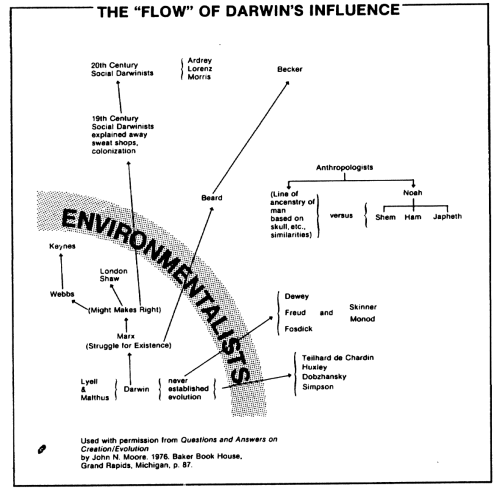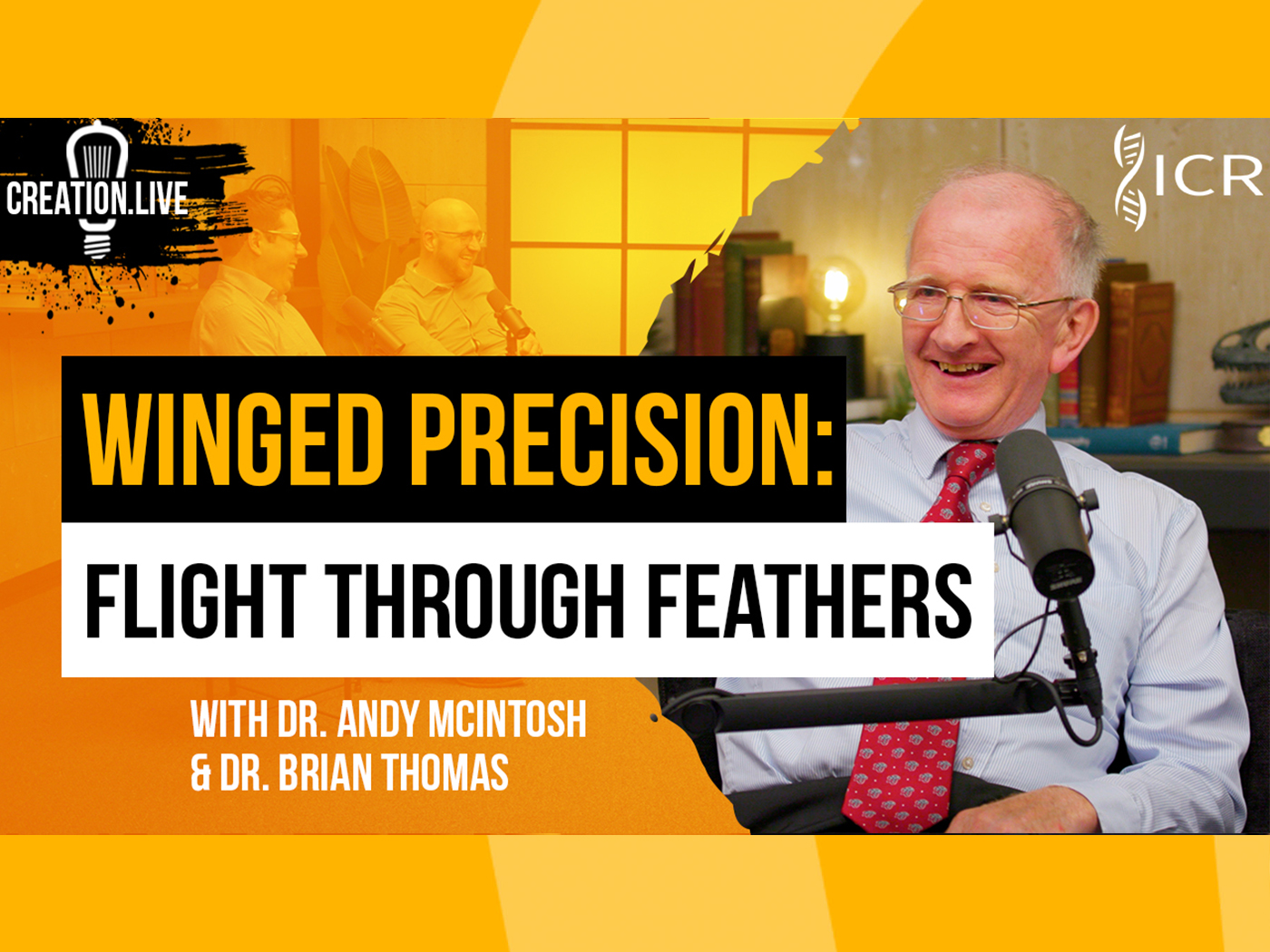Very possibly no other author in the nineteenth century influenced human thought all around the world more than Charles Darwin when he published his two books: The Origin of Species and The Descent of Man. The "lineage" of Darwinism in scholarly thinking is brought out in two excellent and recent reference works: The Comparative Reception of Darwinism, edited by Thomas F. Glick1 and Darwin in America (The Intellectual Response, 1865-1912) by Cynthia Eagle Russett.2 Darwinism was later replaced by Neo-Darwinism which has been replaced by the Modern Synthetic Theory of Evolution. In fact, today, the evolutionary viewpoint is so broadly applied that one can speak most accurately of Total Evolutionism, as including Stellar Evolution, Molecular Evolution, Organic Evolution, and Societal (or cultural) Evolution.
However the broadened viewpoint of Total Evolutionism that has developed in a little over a century from Darwinism is without any significant repeatable empirical data from naturally occurring events. On the contrary evolutionists must speak glowingly and write ingeniously about numerous supra-natural concepts; such as, "big bang" explosion of a dense particle, spontaneous generation of living substance, mountain building due to movement of dry rock masses, division of one land mass into existing continents, and new physical traits through mutational changes. All of these ideas are totally without any empirical support from studies of naturally occurring events of the magnitude involved in such concepts. Yet the circumstantially grounded megaevolutionary point of view involving Total Evolutionism is the world view that has been adopted by influential scholars in every major academic discipline of human thought. Evolution is the supreme over-riding point of view or world view adopted in every major academic discipline by the intelligentsia around the world.
The full range of research in the history of ideas substantiates that selected indoctrination among the intellectuals of the world has increased ever since publication of Charles Darwin's, The Origin of Species, in 1859. Darwin did not "invent" evolution, but his book seemed to provide support for a point of view, a world outlook that was just what the intelligentsia of his day wanted. What Darwin wrote was evidently just what the "mainstream" of academia in England, and subsequently in nation after nation, were waiting for.
Darwin's initial turning from belief in special creation of all living things (since he had actually been taught the "fixity of species" concept, as his teachers evidently were not aware of changes in the thinking of Linnaeus) came while he was on board the H.M.S. Beagle on a voyage around the world. He studied very thoroughly the two volume work on geological changes authored by Charles Lyell, he studied "on the spot" geologic features of South America and the Galapagos Islands in the Pacific Ocean, and he read a book on food consumption and human population by Thomas Malthus.
All of these factors were synthesized in Darwin's thinking in such a manner that he discarded his belief in special creative acts of God as an origin of living things. Darwin replaced that belief with his own belief that competitive interactions of many variations of living things in natural environments resulted over great lengths of time in changes of organisms — some becoming extinct and others producing new varieties that presumably became new kinds of organisms. He called his imagined process "natural selection." When his explanation of this presumed means whereby changes of living things (megaevolution) came about on the earth was read by his contemporaries, such as Herbert Spencer, they adopted the phrases, "survival of the fittest," or "struggle for existence," when they thought about Darwin's ideas. Victorian Englishmen knew much about wars, disease, famines, and weather conditions, and this idea was easily understood.
Evidently most of the scholars attracted to Darwin's ideas were unpracticed in the close study of Genesis of the special creative acts of God regarding origin of heaven and earth and all that is therein. Evidently they were not personally "armed" with the unchanging and unchangeable answers about ultimate origin in the Bible; hence, most English scholars were "susceptible" and became confused by the various speculative ideas and imaginations of Darwin and his followers. They were vulnerable to so-called naturalistic, non-supernatural ideas.
Victorian Englishmen were easily persuaded that some "natural selection" of living things occurred analogously to what they knew about selection of domestic organisms, about groups of human beings with "class" status, about nations competing in world economics, and about naval and land warfare. But Darwin never established scientifically that natural selection was a means whereby evolution (megaevolution) occurred. He only published a lengthy series of persuasively presented arguments. And no scientist has been able to study scientifically the origin of any new kinds of organisms. Yet the megaevolutionary point of view is adopted completely in all the major academic disciplines that comprise human knowledge!
The colossal scope of this "selected" indoctrination can be understood by tracing acceptance of the "struggle for existence" or "survival of the fittest" concepts in fields other than biology. This "lineage" is presented diagrammatically in the accompanying "flowchart" of Darwin's influence. Some details of this broad acceptance of evolutionary thinking by specialists in social studies and humanities as well as science are given in this paper and a second paper to be published later.
Economics
Karl Marx was a prime leader among the intelligentsia of the world who utilized Darwin's concept of "natural selection," or "struggle for existence." Marx wrote his associate Friedrich Engels that he considered Darwin's ideas about competition of living things in the natural environment to be relevant to what Marx reasoned was a warfare or struggle of classes of human beings. Marx and Engels wrote most explicitly of competition between a working class and a bourgeoisie class. For Marx the concept of "struggle for existence" became translated into "class warfare."3
Then as the acceptance of the idea is traced into other countries, the concept of "might makes right" seemed to be sanctioned from the writings of Darwin, and the thinking of Marx. In Germany, Darwin and Marxism were broadly adopted. These two isms can easily be identified as basic to the superman concept of Nietzsche and the superior Aryan race concept of Hitler. THE "FLOW" OF DARWIN'S INFLUENCE
Used with permission from Questions and Answers on Creation/Evolution by John N. Moore, 1976. Baker Book House, Grand Rapids, Michigan, p. 87.

In fact dictatorial actions of Hitler, Mussolini, Lenin, Stalin, Kruschev, and current U.S.S.R. leaders as well, have all been sanctioned supposedly by Darwin’s "natural selection" through the "struggle for existence" and the "survival of the fittest." The Fascist axis nations were believed by their leaders to be most worthy of survival; similarly, the Communist nations — either U.S.S.R. and satellites of the 1970's, or China, Vietnam and other Communist Asian nations — are claimed by their own theoreticians to be most worthy of survival. Empirical evidence is abundant that coexistence with Communist nations does not occur. The nations of Esthonia, Latvia, Ukrania, Bessarabia, and Tibet are mute evidence to this point.
Particularly in England the Fabian Socialists, under the leadership of Sidney and Beatrice Webb, interjected the "struggle for existence" concept into a political, ballot box frame of reference. Fabian Socialists thought in terms of "social evolution" that seemed to be a consistent extension of supposed biological evolution. Of course there have been multiple extensions of Marx's thinking regarding his presumption of class warfare, as can be traced in the works of John Maynard Keynes and his American followers as democratic, socialism became established in the United States after 1932. Repeatedly, Darwin's evolutionary thinking has become a root sanction for governmental intervention — that is, sanction for State government to intervene for the survival of what is "best," according to the reasoning of the elite few (Fabian Socialist, Communist and Democratic Socialists) for the "benefit" of the many (ordinary citizens).
Political Science
Impact of evolutionary thinking in political science can be traced, similar to the force of such thinking in economics, through analyzing the positions taken by those who were influenced by and became followers of Karl Marx, either directly or indirectly, such as Carl Becker and many, many others.4 Becker continued the use of Marxian ideas, and influenced several decades of graduate students by his evolutionary thinking, which was oriented along the struggle for existence line in modern society, until he recognized the logical consequences of that thesis (in the form that might makes right) when he learned of the savage, cruel rape of Europe by Hitler's minions. That there are really no philosophical differences between Fascist Germany and Communist Russia can be documented quite easily by tracing acceptance of Marxism by Lenin and the eventual development of Bolshevism and Leninism. The thinking of the leaders of the U.S.S.R. is rooted deeply in an evolutionary outlook.5
American History
The impact of evolutionary thinking in American history can also be traced in the form of acceptance of the thinking of Karl Marx. The concept of struggle for existence which Marx found in Darwin's book, The Origin Of Species, was used by Marx to support and excuse his thesis of class warfare. Society was the context for the struggle for survival of "class" human beings. Then in American history this relationship of struggle for existence and supposed class warfare was applied by Charles A. Beard6 when he wrote regarding passage of the Constitution of the United States of America.
According to Beard, passage of the Constitution in each of the thirteen colonies was the result of class warfare, wherein the landed gentry and noblemen were for the Constitution and farmers and the poor and indigent were against the Constitution. Thus Beard's ideas were a basis for selected indoctrination indirectly in Darwinian struggle for existence from the time Beard's ideas were published in 1913 until some forty years later when Beard's thesis of class warfare in the colonies was shown to be completely invalid by the research and analysis of actual colonial records of voting practices and land ownership by two independent investigators, Robert Brown7 and Forrest McDonald.8 They accomplished the research that Beard never completed!!
In a later article, the impact of evolutionary thinking on the humanities and on education in general will be outlined.
References
1 Austin: University of Texas Press, 1974.
2 San Francisco: W.H. Freeman and Company, 1976.
3 Zirkle, Conway, 1959, Evolution, Marxian Biology, and the Social Scene, Philadelphia: University of Pennsylvania Press; and Selsam, H. 1959, "Charles Darwin and Karl Marx," Mainstream 12 (6): 28 and 36, June.
4 Brown, Robert E. 1970, Carl Becker on History and the American Revolution, East Lansing, Michigan: The Spartan Press.
5 Zirkle, Op. Cit.
6 Beard, Charles A. 1913, An Economic Interpretation of the Constitution of the United States, N.Y.: The Macmillan Company. See also Robert E. Brown 1956, Charles Beard and the Constitution (A Critical Analysis of "An Economic Interpretation of the Constitution"). Princeton, N.J.: Princeton University Press.
7 Brown, Robert E. 1955, Middle-Class Democracy and the Revolution in Massachusetts, 1691-1780, Ithaca, N.Y.: Cornell University Press for The American Historical Association; and Robert E. Brown and B. Katherine Brown 1964, Virginia 1705-1786: Democracy or Aristocracy? East Lansing, Michigan: Michigan State University Press.
8 McDonald, Forrest, 1958, We the People (Economic Origins of the Constitution), Chicago: The University of Chicago Press.
* Author John N. Moore is Professor of Natural Science at Michigan State University.



















